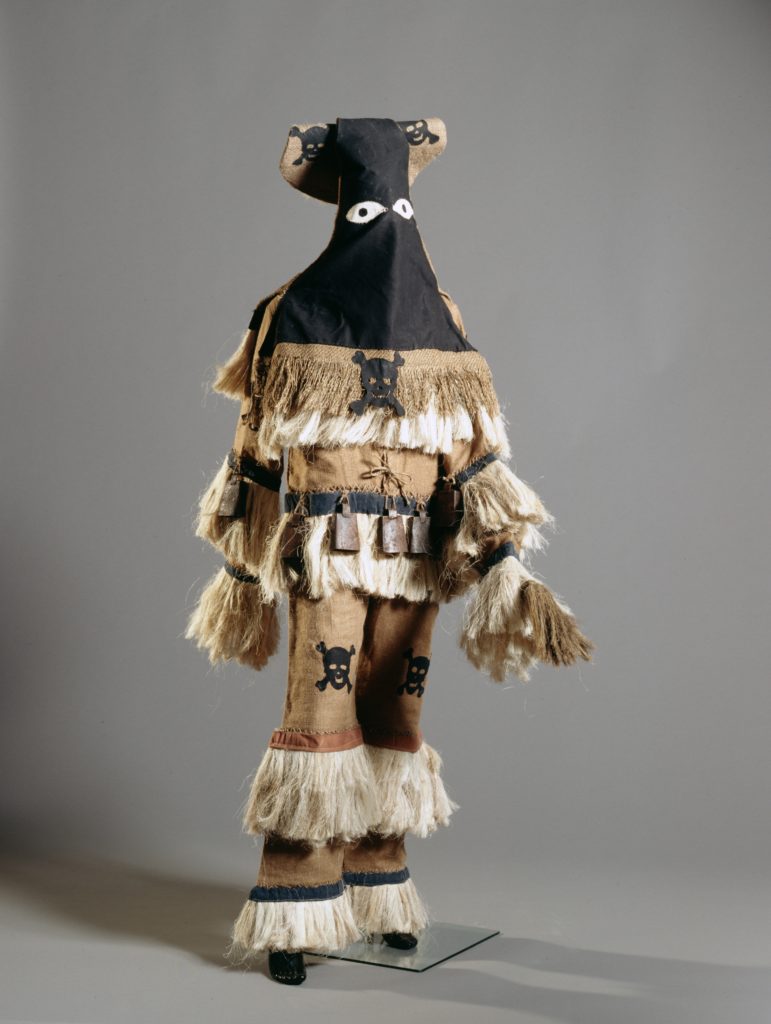In West Africa, secret societies played a very important role within many nations across the region. From mystic and religious to subversive, those secret societies show various aspects and activities, such as organization, officials, initiation and religious teaching. This tradition was brought to the Americas nearly 200 years ago more precisely to Cuba, where there is a secret society that is reemerging and being embraced by young Afro-Cuban males. Named Abakuá or Ñáñigas, this secret society, which is the only of its kind in the Americas, is considered mutual aid brotherhoods. It has been surviving in the port cities of Havana, Matanzas and Cárdenas in Cuba. Currently, young Afro-Cuban males are finding in this Black Religious association in Cuba a way to relief to deal with economic difficulties and the Covid-19 pandemic in the country.
“With this pandemic problem, it has grown a lot, we have a lot of faith,” Juan Ruiz Oña told AFP. Ruiz is the Yamba, the second official at the temple, also known as Efi Barondi Cama by the Abakuás.
This Black religious Association in Cuba has their roots in the secret societies that existed in the Nigerian region of Calabar. The main functions of the latter were to help and help all members who needed it; in addition to perpetuating their culture through Sunday celebrations, where rites were performed that helped to preserve and maintain it’s traditions.
As AFP reported, it is estimated that in Cuba there are about 130 associations. These groups are composed only of heterosexual men, which over time lost their secret character, but not their rigid rules and principles, and respect profoundly the concept of the protection of the “ ecobio”, their brother in faith.
Along with the Cuban Santeria or Regla de Ocha and the Palomonte or Regla Conga, the Abakuá cult is one of the main religions of African origin with strength on the island, but, unlike the other two, it is exclusive to Cuba.
“In this pandemic, which has been going on for several years, we try to contribute with our brothers, because some died, others got sick”, explains Ruiz.
The Abakuá initiation rites have originated in an African tradition that tells the story of the discovery of the Sacred Fish by Princess Sikán, daughter of King Iyamba, of the Efó nation. The Myth of Sikan also determined that only men could be initiated into this religion, for which they should be worthy, fraternal, hardworking, obedient to the ethical code of the cult, as well as a good father, son, brother and friend.

In order to be accepted in the Abakuá association, a sponsor is required who swears that the initiation candidate keeps the principles that govern an abakua: being a man, a good son and a good friend. In addition, the person is subjected to a verification process on his social and family behavior and his moral principles.
The main ñáñigo attributes are the drums of the ritual order, which only the calls to order are performed and which are kept inside the sacred temple called famba. Only the high Abakuá hierarchy has access. The most important attributes is the ekue or drum of foundation and secret, which is played by friction and reproduces the sacred voice of Abasí Tanze. In addition, there are the teams or attributes of the main bosses. In turn, ñáñiga music is performed with another group of drums, which are from the largest to the smallest are called bonkó-enchemiyé, obí-apá, cuchíyeremá and benkomo. The ítons or sticks, the rattle or ekón, and the Erikundis or rattles complete the orchestra.
The Iremes, which in Abakuá are considered devils, are masked dancers that today are symbols of Cuban folklore. They take on a very special meaning and are considered as a symbolic element within the ritual that represents nature. The Abakuá devil is an anthropomorphic figure with his head covered by a pointed hood, which has only a pair of embroidered eyes. El Ireme takes care of cleaning the initiates. They wear brightly colored dresses and motley designs. On the neck, knees, cuffs of the sleeves and cuffs of the feet, are two festoons of frayed rope. Hanging from his waist are several metal rattles that sound when walking and dancing. In their hands, they carry a piece of sugar cane and a branch of ‘bitter broom’. They perform in private functions and public functions, rituals and pure fun. They all represent the spirit of some ancestor. They see and hear, but do not speak; they express their feelings and moods through the gestures of their choreography. During the rites, the Iremes remain inside the enclosure where they officiate the secret ceremonies.
Although the Abakuá does not worship deities, they have saints who sponsor different games or powers and who syncretize with Santeria. Abbasí is the supreme Being; Llarina Allerican, who has correspondence with Shangó; Llarina Oro Conde, the one Yemayá; Llarina Ibandá, who corresponds to Oxum; Itia Arará who is equated with Babalú Ayé, among others.
The Abakuá Secret Society has great significance in the Cuban religious context: it has preserved and transmitted, from generation to generation, for more than a century, the most authentic values of the African ancestors of the Nigerian region of Calabar. Even during the most active period of its’ existence, it was persecuted and condemned by the authorities. Today, this Black religious association in Cuba remains a symbol of brotherhood and fraternity among its followers, who, proud of their heritage, venerate their ancestors.





